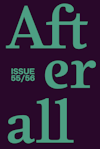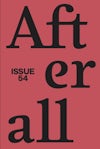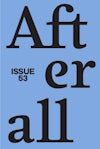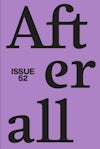
Issue 21
Summer 2009
Editors: Charle Esche, Pablo Lafuente, Thomas Lawson, Mark Lewis, Dieter Roelstraete, Melissa Gronlund, Stacey Allan.
Founding editors: Charles Esche, Mark Lewis.
Table of contents
Foreword
Contextual Essays
- Pornomiseria: Or How Not to Make a Documentary Film – Michèle Faguet
- Against the Archive: Raphael Montañez Ortiz’s Destructivist Cinema – Chon A. Noriega
Artists
Nasreen Mohamedi
- Passage and Placement: Nasreen Mohamedi – Grant Watson
- Making the Maximum of the Minimum: A Close Reading of Nasreen Mohamedi – Anthony Huberman
Heimo Zobernig
- From A(rt) to Z(obernig) and Back Again – Diana Baldon
- Reading Zobernig Through Vaudeville: ‘My God, a black square.’ – Mark Kremer
Michael Rakowitz
- ‘A Visionary Dream, Unrealized’: The Drawings of Michael Rakowitz
- Storytelling – Sofía Hernández Chong Cuy
Events, Works, Exhibitons
- How to Engage with It? Addressing Alejandra Riera’s Maquetas-sin-cualidad – Angelika Bartl
- Undocumented Rumours and Disappearing Acts from Chile – María Berríos
- Foksal Gallery and the Notion of Archive: Between Inventory and Place – Pawel Polit
Foreword
Written by Melissa Gronlund
In 1967, the members of Foksal Gallery in Warsaw loaded their archive into a small boat and threw it overboard into the Baltic Sea…
In 1967, the members of Foksal Gallery in Warsaw loaded their archive into a small boat and threw it overboard into the Baltic Sea. This event, recounted in Pawel Polit’s discussion of the early Foksal milieu, has echoes elsewhere in this issue: in a story where the censors of the Pinochet regime in Chile throw copies of Para leer al Pato Donald (How to Read Donald Duck, 1971), a critical study of cultural imperialism, into the Pacific Ocean. The similarities between the two events are more than superficial: both, despite their radically different intentions, revel in the obsolescence that the archive is meant to safeguard against.
The archive is a well-theorised subject that moves between being a bulwark against oblivion and, conversely, a surfeit of memory, diminishing the capability to remember. In this issue of Afterallit returns with slightly different coding, sat in the backseat of history, and treated with trepid ambivalence: the archive is destroyed, parodied, questioned and contextualised in a number of essays that attempt to turn the self-consciousness of ‘looking back’ to history into a key part of their methodology. In her excavation of rumours of dissident artistic acts in Chile in the 1970s, María Berríos analyses the effects of undocumented actions, and how that undocumented character allows them to function differently from historically ‘certified’ events or works. Michael Rakowitz, one of the artists featured in this issue, also investigates the relationship between an event and its later dissemination through myth and storytelling – a problematic that is also present in Alejandra Riera’s puzzle-like assemblages of her work as provisional maquetasor models, which act performatively on the page or wall, inverting the primacy of the exhibition form over other means of materialisation.
Other essays consider specific instances where the archive is at stake – a body of knowledge and practice to be lost, recouped or fought against. Chon A. Noriega looks at Raphael Montañez Ortiz, a US Latino artist and founder of El Museo del Barrio in Harlem, New York, whose practice aims at the destruction of the archive – ‘recycling’ Hollywood cinema and ritually destroying museum installations – and engages with the problem of the exclusion of minority and working-class artists from film archives and the artistic canon in the United States. Michèle Faguet considers the history of Colombian cinema, in particular the films of pornomiseria, which turned poverty into a spectacle for Colombian and international middle-class audiences in the 1970s. And Paweł Polit looks at the two competing claims of the founders of Foksal Gallery in Warsaw, trying to open a space for the contemporary fulfillment of the aims of their ‘theory of place’.
Purchase
The publication is available for purchase. If you would like specific articles only, it is also available individually and to be downloaded as PDFs.
Purchase full publication
Buy via University of Chicago Press
Buy via Central Books
Purchase individual articles
Buy via University of Chicago Press




